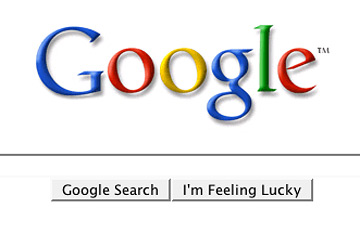
Google is the world's most popular search engine. More than 380 million people use it every month. Known for its simple design and comprehensive cataloging of billions of Web sites, the company's free search tool enables consumers to type in any name, term or phrase and find related material online. Conceived by two Stanford graduate students in 1996, Google has grown into a $150 billion giant that employs more than 9,000 people and offers a wide range of software and search services to consumers and corporations.
Google's name is a play on the word Googol, a mathematical term referring to the number that consists of a 1 followed by 100 zeros. It alludes to the ever-expanding scale of the World Wide Web and the apparently limitless scope of the company's ambition. Before making the site public, founders Sergei Brin and Larry Page dubbed their search tool "BackRub" because it was designed to analyze a site's "back links." That meant measuring a site's relevance and significance by looking at how many other sites — and which ones — link to it. An advanced version of the formula proved remarkably effective by 1999, quickly vaulting Google over competing search services. Today Google's method, now called PageRank, evaluates more than 100 factors on a Web page to determine its importance.
Successful as its search service is, Google has steadily expanded beyond it. In addition to free e-mail, calendar and photo organizing tools, the company now offers word processing, blogging and spreadsheet software. Google also has a popular tool called Google Earth, which combines satellite imagery, maps and graphics to give users a searchable, three-dimensional, pictorial representation of places all over the world. In most cases, the company provides its software and services to consumers free, drawing revenue instead from advertisers.
Google has also diversified its search tools in recent years, enabling consumers to look for images, videos, news items or blog entries. Moreover, consumers can use a free Google software tool to search their own computers or search the Web from their mobile phones.
As reports of Google's usefulness have spread across the Web, largely by word of mouth, it has become one of the world's five most popular sites of any kind. Over the past five years, Google has increasingly focused on offering its services to foreign countries in native languages. It currently has 112 international domains, and half of its Web visitors use the site from outside the U.S. Not all growth has been easy. Google's 200X expansion into China was met with controversy when the company agreed to self-censor its Chinese site, limiting the information available to Chinese users on topics such as Falun Gong and the 1989 Tiananmen Square massacre. The company argued that it would be worse to pull out of China entirely than to limit its search results. In January 2007, Google beefed up its Chinese presence by buying the multimedia site Xunlei. But the country remains a challenging market, in which the competing search company Baidu handles nearly two thirds of search queries.
Google espouses a "don't be evil" policy, which company executives say means not using alienating tactics to make money off its customers. For instance, the company refuses to sell data it collects about how users search, saying such sales would be a breach of trust. Google also stresses the respectful treatment of its employees, offering benefits that are widely considered among the technology industry's most generous. Under an efficiency formula devised by CEO Eric Schmidt, employees are encouraged to spend 70% of their time on their core responsibilities, 20% on related projects, and 10% on any creative idea they are interested in pursuing. In a section of its site called Google Labs, employees can test out their software and product ideas in hopes they may one day become part of Google's main offerings.
In the past two years, Google has placed growing emphasis on partnering with companies like eBay, Dell, MTV and AOL to distribute advertising and share revenue from collaborative ventures. The company's AdSense program enables anyone with a Web site to outsource his ad space to Google, which places ads on it and then shares the revenue that accrues when visitors click on ad links. Thus far the ads have consisted primarily of simple lines of text, but the company has begun experimenting with video ads in an effort to capitalize on its $1.65 billion acquisition of the video-sharing site YouTube.com in 2006.
Google has drawn fire for some of its expansion efforts, including a project to scan and archive millions of books. Some publishers worry that the service may ultimately allow readers to access copyrighted material without buying their books. Google maintains that the project does not violate copyright rules, since users can access only short snippets of text unless the book is out of copyright or the author has given Google permission to use it. From Google's perspective, the project is one more step on the way to realizing its simple but sweeping mission: to make the world's information easily and quickly accessible.
—Jeremy Caplan
